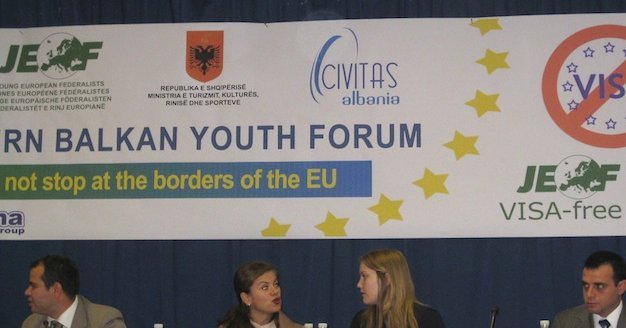Over 50 young people and NGO representatives from Albania, Belgium, Bosnia and Herzegovina, Croatia, Kosovo, Macedonia, Montenegro, Norway, Serbia and Slovenia agreed to call upon the EU institutions and national governments to continue the visa liberalisation process for the Western Balkan region in order to ensure free movement of people for all.
The conference was addressed by the President of JEF-Europe Mr Philippe Adriaenssens, the President of JEF-Albania Mr Vladimir Thano, the Minister of Interior Affairs of the Republic of Albania Mr Lulzim Basha, the International Secretary of JEF-Norway Ms Marlene Hakkebo and numerous Albanian NGOs.
After some fruitful debates the participants of the Balkan Training Days (BTD10) and the representatives of the Albanian NGOs present at this Western Balkan Youth Forum approved the so-called Tirana Declaration with the following main points:
The EU’s commitment to the European future of the region has contributed to the fruitful development of regional cooperation, democratisation and developmental processes in each of the countries concerned, as well as to bringing stability to the region.
The governments of the region have demonstrated that they can deliver if the conditions are clearly defined, transparent and measurable as in the case of visa liberalisation.
However, the current situation is neither enough to further consolidate democracy in the Western Balkan countries, nor does it ensure implementation of reforms, enhancement of regional cooperation and preservation of the hard-won progress on peace and stability.
Therefore we call for the revitalisation of a lagging process, by undertaking the following:
– Emphasise the importance of preserving stability in the region and strengthening the prospects for its further democratic development and economic recovery.
– Reaffirm the commitment of the EU and countries of the Western Balkans to work together to accelerate the process of accession and condemn any further fragmentation and division along ethnic lines.
– Encourage the countries of the region to strive for the following goals: 1. candidate status for all the countries by the end of 2011, and 2. opening of accession negotiations with Macedonia by the end of 2010 followed by other front-runners by the beginning of 2012 at the latest.
– The EU should define clear, transparent and measurable benchmarks, which should serve a dual purpose: 1. allow civil society organisations to monitor the progress their country has made and hold their governments accountable, and 2. allow scrupulous in-country monitoring by the EU and civil society organisations which would facilitate holding the governments accountable for their progress.
– Reiterate that “bilateral issues should be resolved by the parties concerned and should not hold up the accession process” as specified by the Commission’s Enlargement Strategy and Main Challenges 2009-2010. Countries should undertake a binding commitment in that respect before joining the European Union.
– Give new impetus to the completion of the visa liberalisation process for the entire Western Balkan region and encourage national governments and the European Commission to enable visa-free travel for all, so as to improve mutual communication and cooperation.
– Express the readiness of both the EU and Western Balkan countries to establish and maintain regular dialogue with civil society organisations involved in the processes of Europeanization of their respective countries and monitoring of the process of accession of the EU.
The countries of the Western Balkans will benefit from a reinvigorated and clarified policy towards EU accession. Equally, the current realities of economic instability and the internal reform conditions for EU institutions and member states under the Lisbon Treaty will benefit from stable and committed partners in the enlargement process. We ask that the support and assistance to Western Balkan countries in preparing for their EU membership is a leading priority for the EU, just as it is essential to a stable, prosperous and cooperative future for the Western Balkan region."
This declaration was then presented to the Albanian Prime Minister Mr Sali Berisha who met the participants of BTD10 in the late afternoon and engaged in an open discussion with them on the results of their work.


Follow the comments: |
|
